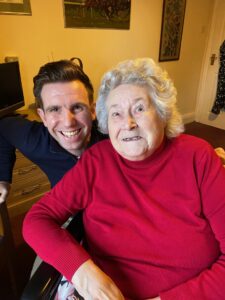
24 Apr 2025
Max’s ALL Journey
In June 2008 18-year-old Max England had just finished his A Levels and was looking forward to starting university in the autumn. But it was not to be, as Max started showing strange symptoms which eventually led to a diagnosis of leukaemia.
“Max went away on a summer vacation with his friends,” said Max’s mum Ann, who now lives in Warsash, Hampshire. “Whilst he was away, he had symptoms of lethargy and one time he fainted. On return from the vacation his lethargy increased to the point he was almost constantly sleeping. Forty-eight hours after he came home we called the doctor. By this time Max was unable to walk to the surgery which was a few miles away and which he normally would have managed easily.”
The family was living in Bakewell, Derbyshire at the time and Max was immediately sent by ambulance to Royal Hallamshire Hospital in Sheffield where he was given a blood test. Three days later doctors delivered the devastating news to Max and his family that he had acute lymphoblastic leukaemia (ALL).
“We were so shocked and panicked. Would Max die? Would he live? We just didn’t know. We didn’t know anything much about leukaemia and what the future might hold. In short, we were terrified.”
Max was kept for the first four weeks in an isolation ward and chemotherapy treatment started immediately.

Max with Nan, Doreen
“Max’s health fluctuated during this time,” said Max’s dad Steve. “At one point he had a bad reaction to a combination of drugs which led him to have several mini strokes. This in turn led to him losing his speech, which was terrifying. He was on a drugs trial and we learnt that on one previous occasion someone else on the same trial had the same symptoms. The conflicting drugs were rectified and within 24 hours the problem was resolved.”
Happily, during the last three years of his chemotherapy treatment, Max was at Oxford Brookes University studying for a degree in Planning which he achieved in 2013. Max is now 35 and living life to the full in Teddington, Middlesex, working in London as an estate agent and has regained his health enough to run two London Marathons. He got married in 2023 and he and his wife Katy are expecting their first child in April this year.
“Strangely Max’s leukaemia was an enriching experience despite the challenges faced,” said Ann. “It made us a very close family unit who appreciated each other for who we are. We had major support from our family and our friends. We took inspiration from Max’s fortitude and the beautiful innocence of his friends from school. Their viewpoint throughout the whole situation was that Max would always be well and so it has proved to be.”
Related posts
7 November 2024
University of Southampton’s Dr Giorgia Chiodin Wins Olive Boles Innovation Award
Dr Giorgia Chiodin from the University of Southampton has been awarded the prestigious Olive Boles Innovation Award for 2024. Awarded annually to a Leukaemia UK John Goldman Fellow, this award…
1 December 2022
Leukaemia UK launch Winter Appeal celebrating mother of two able to enjoy Christmas with her family after life-saving stem cell transplant
Today, Leukaemia UK launch their Winter Appeal to raise vital funds for leukaemia research and stop the disease from devastating more lives. Last year Emma Leeming, an English teacher and…
14 March 2023
Percy & Nell says Pants to Leukaemia with bespoke charity collaboration
Independent clothing brand Percy & Nell has produced a unique range of sweatshirts, t-shirts, beanies and tote bags, with all profits going to Leukaemia UK. The collaboration comes off the…
31 October 2023
Chris Dew joins Leukaemia UK as Director of Finances & Resources
Leukaemia UK is delighted to announce the appointment of Chris Dew as Director of Finance & Resources, following ten years as Chief Financial Officer at musical therapy charity Nordoff-Robbins. The…